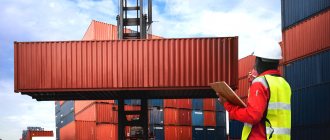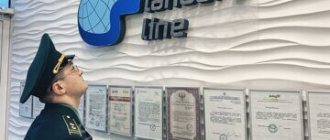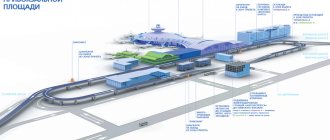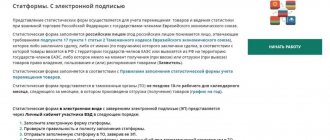If you often place orders in foreign online stores, then sooner or later you will encounter Russian customs. In this article, we will help you figure out why your parcel may be delayed, how this can be avoided, and how to behave at customs.
- What does the package do at customs?
- What happens to the parcel at customs?
- Why may a parcel be delayed at customs?
- What to do to pick up a parcel from customs
- What happens if the parcel remains at customs?
- Some tips if your parcel is detained at customs
How long can a package stay at customs?
After the parcel reaches customs, it undergoes a comprehensive check, starting with an X-ray scanner, with the help of which goods prohibited for import are identified. If the responsible employee discovers suspicious content, he will notify the experts, as well as the dog handler. A team of specialists, usually consisting of several people, will subject the shipment to a thorough check, which will significantly increase the time it takes to complete the customs control procedure.
It should be borne in mind that the following are prohibited for import into Russia:
- alcoholic products;
- narcotic drugs, precursors for their production, pharmaceuticals;
- various types of weapons;
- explosive substances;
- certain fishing gear and accessories;
- some types of meat and fish;
- dairy products;
- a number of grain and vegetable crops;
- sanctioned goods;
- spy's equipment.
The standard customs inspection period is 3-5 days. It may take longer due to the following factors:
- Incorrectly completed accompanying documentation and errors made when specifying passport data.
- The declared value of the product does not correspond to its real price.
- The recipient has used up the monthly limit for duty-free purchases of goods from abroad. Limits apply only to purchases that require a TIN. Also, an individual has the right to import purchases into the territory of the Russian Federation of no more than 31 kilograms per month.
The parcel will be detained if the customs inspector has reason to consider it a commercial shipment. If a shipment contains more than three units of identical goods, it will undergo additional inspection, which may require the provision of additional documentation. In such situations, the recipient must appear at customs to give an explanation of the reason for the import of a large consignment. If he cannot prove that the contents of the parcel will be used exclusively for personal needs, he will have to pay a fee. Otherwise, the package will be sent back to the supplier.
We communicate with the customs officer
If the customs officer himself conducts the conversation in a humorous, benevolent tone, you can maintain this tone, but, in any case, you should not be talkative. Words are silver, silence is gold. Remember that for a customs officer, everyone crossing the border is a potential violator, and his attitude towards you can change at any moment. His task is to get you talking, to force you to be frank, in the hope that you will blurt something out. Any careless word you say can be used against you. Talk to the customs officer in a friendly tone, but in your conversation use general phrases, and in general, try to say as little as possible. Remember: the customs officer does not ask a single extraneous question just like that! In 80 cases out of 100, a question, even asked in a humorous tone, has a specific purpose, and your answer determines whether you will continue your trip, or whether this checkpoint will become the final destination of your journey. Do not discuss the actions and behavior of a customs officer among yourself, even in a language that seems foreign to him: many customs officers not only have excellent hearing, but also speak foreign languages and the languages of a neighboring state, although they try not to show it.
In no case should you talk to the customs officer in an aggressive tone (which women are very prone to), shame him, or enter into arguments with him. Any customs officer perceives this as an attack on his status, immediately mobilizes internally and begins to apply the entire range of measures of moral and psychological pressure in relation to the “problem person”. The answer to this is simple: the incident, as a rule, is very carefully observed by other citizens who are also crossing the border, and the customs officer considers it necessary to punish the disobedient person in front of everyone in order to nip in the bud the slightest attempts to resist his will. And here he will not consider any measure of punishment excessive: the more the “troublemaker” is punished in front of everyone, the more obedient everyone else will become.
If a customs officer asks you to open any of your luggage (bag, box, drawer), follow his request unquestioningly. If for any reason it is difficult for you to fulfill his request, explain the reason in a calm tone and, in as much detail as possible, list everything that is inside the piece of baggage that interests him. If he still insists, mentally curse and tear, cut, open - he will still insist on his own. If you do not want the customs officer to personally go through your things, politely offer him yours. Know that the customs officer will not dare to refuse you this! According to the rules, he has no right to rummage through other people's things during the search, so he will accept your offer of help favorably. But if you reprimand him, he will demand that you personally unwrap every shirt, every T-shirt, every sock. So keep that in mind.
If you need any indulgence, service, benefit from a customs officer, you can ask him about it, be sure to explain the reason. You can ask a customs officer for a lot, but it is much more difficult to “knock out” something. A customs officer, as a rule, is resistant to all methods of psychological pressure and is deaf to requests, tears, complaints and threats.
What to do if the “Customs” status is not updated for a long time
You can understand that a parcel is “stuck” at customs by the following signs:
- By track number. When tracking through a tracking service, a mark should appear notifying the recipient that his parcel has been sent for additional customs inspection.
- The point of intended delivery will receive a registered letter from customs. It is unlikely to contain detailed information about the reasons for the delay. However, from the letter you can find out the weight of the shipment and the period of its storage in the customs warehouse.
Having received a registered letter from customs, you need to come to the specified address, taking with you the following documents:
- Notice received by registered mail. Based on this notification, the customs representative has the right to initiate proceedings.
- Photocopy of passport (first page + registration). Most often, paid photocopying services are provided directly at the customs point.
- Document confirming the fact of purchase. For example, invoice which is a unique identifier. It can be both paper and electronic. You can download the invoice on the official website of the online store.
- Description of the contents of the parcel. Photos must be attached to the text description. The easiest way is to download them from the website or seller’s page.
- Funds (cash) to pay the state fee. If you exceed the regulated limit, you will have to pay 30 percent of the total cost of the parcel. If you exceed the maximum permissible weight, you must pay 4 euros per kg.
To prove that the shipment is not commercial, you will need to provide the customs officer with photocopies of documents belonging to relatives, including passports, marriage and birth certificates. It must be taken into account that the customs inspector does not work with the parcels themselves, but directly with the accompanying and other documentation. The shipment itself is located in the warehouse, and completely different people are involved in issuing it. Therefore, it is necessary to thoroughly prepare for the meeting with the inspector, taking with you as many documents and confirmations as possible.
It is difficult to give a definite answer to the question of how much time you will have to spend at customs waiting for a decision on the fate of the stuck parcel. You can get stuck in a queue for several hours. Therefore, before your visit, it is recommended to stock up on a small amount of provisions and take a thermos with hot tea or coffee with you. It wouldn't hurt to bring a tablet or laptop. Not all international post offices have Wi-Fi. For example, in the Moscow branch on Varshavskoye Shosse, even mobile Internet reception is poor. For this reason, it is worth downloading the necessary documentation to the internal memory of the device in advance.
Before your visit, you should study the work schedule of the customs office. For example, a branch located in Moscow on Varshavskoye Shosse does not accept individuals on Mondays, and on Saturdays it is open until 16:45.
Problems of customs services
Problems and prospects for the development of the customs services system in Russia
Another problem, which also determines the complexity of the task of improving customs activities, is the dual nature of its focus: on the one hand, it is called upon, of course, to guard state interests, on the other hand, to meet the needs of entrepreneurs participating in foreign economic activity interested in reducing transaction costs and saving time on administrative procedures.
Moreover, the harmonization of these tasks is still far from being achieved. The third problem is the complex structure of the elements of the customs system and the infrastructure that ensures its functioning. Moreover, this system needs a significant level of increasing its harmonization and coordinated activities in the direction of solving the problems of improving foreign economic activity.
The solution to the above-mentioned problematic tasks is associated with numerous risks, the overcoming of which places high demands on the organization of processes of customs and near-customs activities, increasing the professionalism of the personnel of customs structures.
The harmonization of the regulatory framework is due to the need to implement the methodological recommendations of the World Customs Organization, within the framework of which the General Agreement on Tariffs and Trade operates, which established the norms of customs administration, formulated as principles, the most important of which include: limiting administrative barriers; eliminating the attitude towards customs formalities as hidden restrictions on free trade.
The institutional basis of the Russian customs system is at the stage of development. This system, which currently represents more of a conglomerate (rather than a structured complex that coherently acts for the benefit of the interests of the state, the business environment and the population), includes two main elements: a system of managers and economic entities of customs activities, as well as infrastructure (customs and transport and logistics).
In turn, the system of managing and economic (service) entities of customs activities consists of the following institutions:
- Federal Customs Service of the Russian Federation, as the main system-forming body of the Russian customs system, carrying out a set of customs administration functions aimed at implementing regulatory, control and fiscal functions;
- a set of commercial organizations (in particular, the institute of customs representatives, which includes the federal state unitary enterprise "ROSTEK", transport and logistics enterprises, etc.), which in some cases operate in the customs sphere, implementing the functions of customs services for entrepreneurs , with greater efficiency than government agencies;
- non-profit partnership of professionals in the field of foreign economic activity "Guild PROVED", created on the initiative of the Agency for Strategic Initiatives to promote new projects and taking part in the work on the formation and implementation of the road map of the project "Improving Customs Administration".
The infrastructure that ensures the functioning and development of the customs system includes customs infrastructure and transport and logistics infrastructure.
Customs infrastructure facilities include stationary technical means of customs control, customs laboratories, temporary storage warehouses and warehouses established by customs authorities and located mainly in border zones, as well as administrative buildings, information and analytical centers, information and telecommunication networks, computing and situation centers customs authorities.
The objects of transport and logistics infrastructure are technological complexes that ensure the organization of the movement of goods and the provision of transport and logistics services (railways and waterways, highways, warehouse and container terminals, intermodal transport and logistics complexes, etc.).
Accordingly, the regulation of customs relations in international economic activity is recommended by a complex system of norms. Thus, in the practice of the Russian customs service, the norms of the Customs Code of the Customs Union are supplemented by the norms of Federal Law No. 311-FZ “On customs regulation in the Russian Federation”.
In the activities of customs authorities, it is advisable to identify 4 main functions, which together constitute the mission (public purpose) of this service:
- economic;
- fiscal;
- ensuring national security;
- service
The emphasis in the activities of customs authorities and the corresponding procedures for assessing efficiency are based primarily on the assessment of fiscal functions, as well as functions related to ensuring national security.
Let us note that in 2012-2013 there was a quantitative increase in imported goods in terms of physical and value indicators, primarily in light industry product groups (clothing, footwear, etc.) and food products. The decline in these groups of goods (especially noticeable in household appliances) is largely due to the changed geopolitical situation (the introduction of sanctions by a number of countries against Russia and the already emerging positive trend associated with the adoption of emergency measures for import substitution, primarily for products nutrition).
The presence of such a complex infrastructure, for the self-sustaining of which a system of norms and recommendations is developed and used, to a certain extent impedes the simplification of the chain of operations with imported and exported goods, complicates the performance of control functions, leads to loss of time and additional financial costs.
In this regard, the development of the customs system for the future involves:
- adoption of a set of organizational and technological measures to save time for participants in foreign trade activities when processing customs documents;
- increasing the capacity of checkpoints located on the border;
- development and implementation of uniform standards and regulations for customs administration that comply with international standards in order to increase the efficiency of the activities of participants in foreign trade activities;
- the use of unified customs documents and declarations in electronic form, leading to a reduction in administrative costs and time savings for participants in foreign economic activity;
- improvement of professional training of specialists in terms of customs activities and organization of foreign economic activity;
- use of a unified automated information system of customs authorities (for the emerging economic space of the EuroAsEC);
- development of a network of customs and logistics terminals in border regions of the Russian Federation;
- organization of interaction between the customs system and the business community (based on the principles of public-private partnership).
According to the world practice of organizing customs, there is a set of measures for risk analysis and management [3]. Data on the analysis of risks and corresponding consequences (negative factors and offenses of participants in foreign economic activity) are necessary for the management of regional customs departments, customs houses and customs posts to make informed management decisions aimed at both ensuring national security and creating comfortable conditions for foreign economic activity participants. activities that contribute to the acceleration of foreign economic turnover.
According to paragraph 2 of Art. 358 of the Customs Code of the Customs Union (TC CU), the risk management system provides for the solution of preventive tasks to prevent violations of legislation when moving goods across the customs border of the state. In particular, in order to achieve these goals, the Federal Customs Service of the Russian Federation develops and sends to the customs authorities risk profiles containing appropriate instructions on the application of customs control measures, including those related to a reasonable reduction in the volume of customs inspections of imported and exported goods of enterprises whose activities are characterized by a low risk of customs violation legislation. It should be noted that in a number of regions, risk profiles are developed by specialist experts from the regional customs departments themselves.
Considering the significant amount of data and documents provided by participants in foreign trade activities to customs authorities, the task of introducing information technologies and consolidating norms, standards and methods of their application in the field of legal and administrative regulation of foreign economic activity will have to be solved.
It should be noted that significant savings in time for processing customs documents will appear only when the EurAsEC Customs Code comes into force in full, standard lists of general processes will be regulated in accordance with the Decision of the EEC Board of November 12, 2014 No. 260, allowing to ensure the functioning of the regime in the customs sphere "one window" In this regard, the norm “customs declaration is carried out in written and (or) electronic forms” (Article 179 of the Customs Code of the Customs Union) should be replaced by the norm “customs declaration of goods is carried out in electronic form” and only in a number of cases “can be made in writing” (Article 74 Labor Code of the EurAsEC).
In practice, the methodology developed by the Federal Customs Service of the Russian Federation for assessing the effectiveness of the application of forms of customs control is used, based on the expert method, which provides for the use of weighting coefficients in various areas of activity of customs authorities.
The methodology uses the following indicators of the effectiveness of applying the form of customs control, assessed by a group of experts:
- the economic effect of applying the form of customs control for the reporting period;
- the number of identified violations of customs rules that resulted in the opening of cases of administrative offenses during the reporting period;
- dynamics of changes in the number of cases of application of the form of customs control;
- the period of time required to apply the customs control form, etc.
Although the use of this methodology makes it possible to optimize the number of applied forms of customs control and measures to minimize risks based on the principle of selectivity, it also has disadvantages, the main of which should include:
- excessive focus of method indicators on the performance of fiscal functions, on the basis of which an insufficiently substantiated method is made on the effectiveness of customs activities;
- lack of relationship between the efficiency of the functioning of customs and the efficiency of the functioning of business structures as participants in foreign trade activities.
Thus, it is advisable to focus the improvement of methods for assessing the effectiveness of customs authorities not only on the performance of fiscal functions, but also on the successful implementation of all functions that constitute the mission of this service, including increasing the quality of services provided, aimed at creating conditions for the successful functioning of business structures, participating in foreign economic activities.
It should be noted that both the implementation of fiscal tasks and the growth of activity of Russian business structures in traditional and new international markets in foreign economic activity equally pursues state interests, including in the current geopolitical situation.
Reviews
I ordered an on-board computer for a car on Aliexpress. The parcel reached Russia quite quickly, but was stuck at customs in Moscow for a long time. The status changed only after she went back to China after two weeks. The seller does not refuse to return the money, but taking into account postage costs the amount will be much less.
Alexey, Rostov-on-Don
I bought an inexpensive Xiaomi tablet on TaoBao in a single copy, its cost is less than $250. Therefore, it is absolutely unclear to me why the parcel was stuck at customs and how to speed up the inspection process, since customs is located in Moscow, and I live in the Belgorod region.
Nikolay, Stary Oskol
Why my cargo?
In practice, additional inspection is assigned only in 6% of cases; all other cargo undergoes customs clearance based on the documents provided. Be prepared to closely examine the product in the following cases:
- you declare duty-free import/export;
- you declare a low VAT rate;
- you are transporting multi-component equipment or other technologically complex cargo;
- you declare a very low customs value;
- you are transporting an object of cultural heritage or historical value, precious metals or stones, or live cargo.
To get through customs as quickly as possible, you need to prepare in advance not only the required documents, but also those that the inspector may request to confirm the information specified in the declaration.
About contacting the postal service
A package from the USA is stuck at customs: who to call in this case? First of all, you should contact the Russian Post to make sure that the order has actually reached the border. But, since most often they place all the blame on the US Post Office, it is better to immediately write to Rossvyaz. You can send an email and/or directly on the website something like:
“(date of application - required) a message was sent to my address from America, declaration number (the corresponding set of letters and numbers is indicated). (date of departure from the States) the order left the country, but was not registered in the Russian Federation. I need to know the exact date when the shipment will arrive at the post office and the reasons why this did not happen on time. According to Article 5 of the Federal Law dated May 2, 2006 No. 59 “On the procedure for considering appeals from citizens of the Russian Federation,” an investigation into this incident should be conducted and I should be notified of the results.” In this case, you can attach the sender's address and the delivery note.
A warehouse in the USA for purchases has nothing to do with it in this case - they only require the shipment number.
How will I know about the problem?
Declaration of goods occurs electronically using special programs. There, you or your broker will receive an email notification from Customs that additional checks have been scheduled. This will be a specific request with clear instructions on what exactly the inspector needs to make a decision on the release of goods from the customs point.
In this form, a notification of a request from customs appears in the Master Declarant program. When opened, the user will see an official requirement signed by the inspector.








